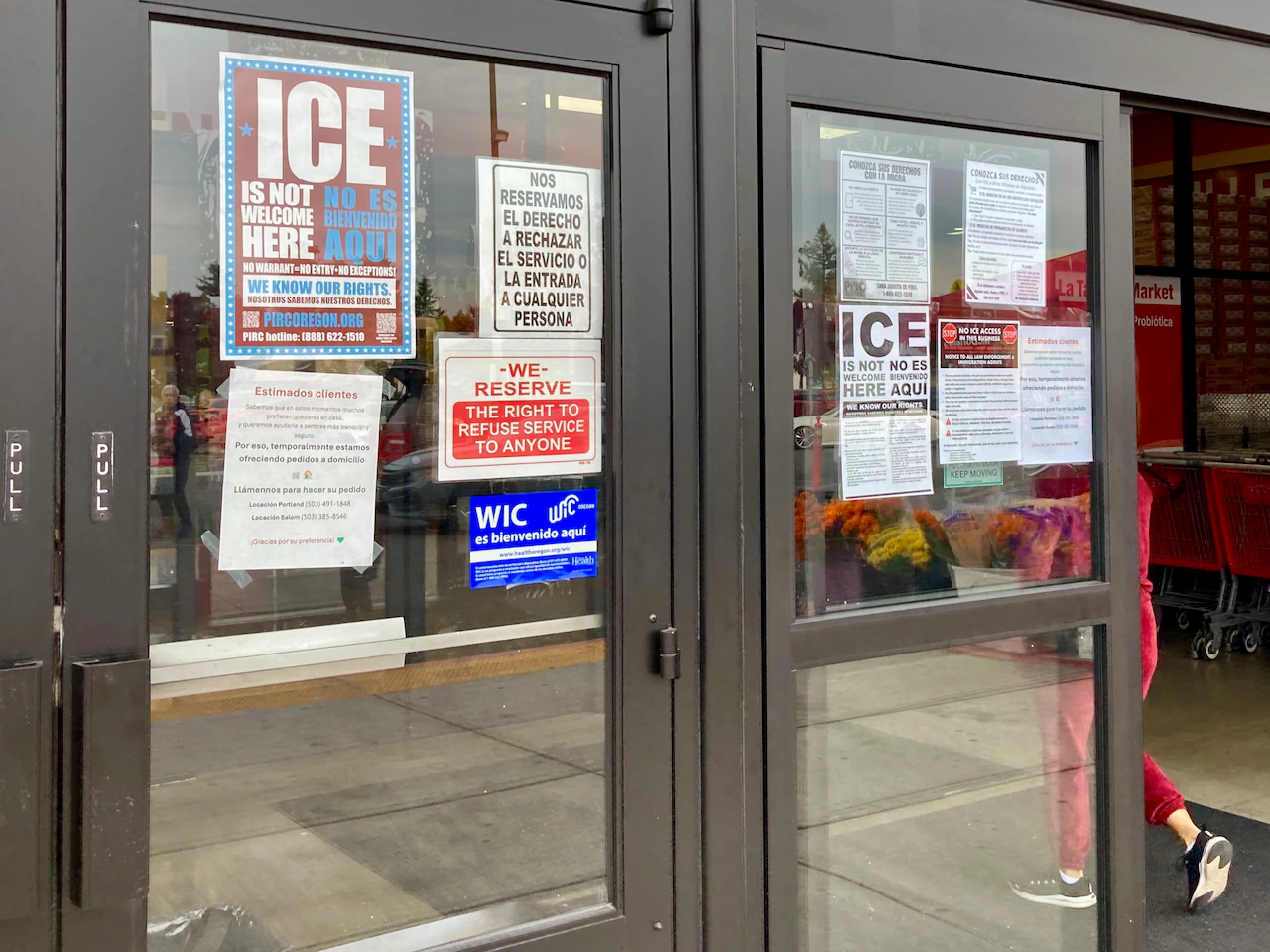Copyright The Oregonian

At La Imperial Bakery in Hillsboro, October typically brings a rush of customers eager to celebrate Día de los Muertos, the Mexican Day of the Dead. They buy bags of pan de muerto, conchas and other pastries galore. Not this year. Over the past few weeks, as the federal government has ramped up immigration enforcement and agents have seized people from cars, streets, apartment buildings and parking lots across the Portland metro area, sales at the family-owned bakery have plummeted by at least 40 percent, said owner and lead pastry chef Moises Pineda. “The clients are not coming,” Pineda said. “We are really worried.” The bakery, which sells breads, specialty cakes, desserts and drinks, has been a community fixture for 15 years. At the end of July, its owners opened a second location in Beaverton. But fear is now keeping customers away, Pineda said. Most of his remaining sales are through Uber and other local delivery services. Pineda isn’t sure how he’ll be able to pay his employees and keep the lights on. “The bills, they don’t wait. I don’t know what’s going to happen,” he said. The story is similar at other Latino businesses across the Portland Metro area, and it’s a worrisome trend for neighborhoods with a large concentration of Latino businesses, including Rockwood on the border of Portland and Gresham and downtown Hillsboro. Business owners and managers report stark declines in sales since mid-September – some as much as half. It’s worse than during the pandemic, many say, with empty store aisles, deserted restaurant floors and workers resigning or regularly calling in sick out of fear. That fear has spread and is deepening as videos and photos of federal agents detaining people in Gresham, Portland, Hillsboro and other surrounding communities surface regularly on social media. Many are posted by Latino community members and white activists who track the whereabouts and activities of U.S. Immigration and Customs Enforcement’s (ICE) agents in real time to warn people to stay away from certain neighborhoods or locations. Some of the videos have shown federal agents breaking car windows, pulling people out of vehicles, throwing individuals to the ground, and in one instance, kneeling on a man’s body as he pleaded for air. Others have documented agents bursting into a home and pointing guns at a family, including an infant, or shooting people with pepper bullets – often just a few feet or a block from local businesses. Some reports are legitimate and subsequently verified, others aren’t accurate. Nevertheless, they fuel the anxiety that’s keeping people at home. In response, business owners have tried to verify reports of ICE activity shared online. They’ve posted signs stating “ICE is not welcome here” in store windowS. Some have locked their doors. Others are turning to online sales and local deliveries. The owners and managers, mostly Hispanic, say they’re also afraid for employees and themselves. Like their customers, they say they’re aware of ICE agents, without judical warrants, arresting a U.S. citizens, green card holders, people with work permits or another form of legal status, and targeting those who have brown skin or speak Spanish. “The psychological pressure is enormous, for both employees and customers,” said Marco Perez, assistant manager at Supermercados Mexico, a supermarket in outer Southeast Portland. “We all wonder when it’s going to be our turn to be taken.” Manuel Bejarano, who owns the Paisanos Plaza flea market with locations in Gresham and Hillsboro, said the deep-seated anxiety has gutted his business. He rents out spaces to dozens of tenants who run clothing shops, food stands and other small enterprises. He has more than 45 tenants in Hillsboro and 20 in Gresham, and said 95% of them are Hispanic-owned. The visible presence of ICE agents in the parking lots, along with arrests near the flea markets, have upended the lives of his tenants, clients and Bejarano himself. The spaces typically open daily, attracting a steady stream of customers. But in recent weeks, Bejarano said, only half of the vendors have opened at the two locations and many have told him they’ve had numerous days when they haven’t sold a thing. “They are hardworking people, working honestly, with families to support,” he said. “And now, it’s difficult for them to do that.” Bejarano is facing his own financial wall. Since December, new rentals have evaporated. And his current clients are unlikely to pay him, he said. “There are no clients wanting to rent spaces. And our current tenants either have no sales or aren’t opening due to fear of being detained by ICE and therefore won’t have the means to pay their rent,” Bejarano said. His own monthly expenses amount to $69,000 per month for the two locations, plus utilities, employees and other expense, he said. Without those rent payments, it will be impossible to meet his own lease obligations in November. The arrest that triggered the drop in sales at his Hillsboro location took place earlier this month on the same day U.S. Secretary of State Kristi Noem visited Portland. News of the arrest went viral online, with some accounts claiming the arrest took place inside the flea market. It actually happened outside, in the back of the building, Bejarano said. Regardless, the future of the flea markets and their small businesses are hanging by a thread, Bejarano said. He just signed a 10-year lease extension on the Hillsboro location in July and has eight years left on the lease in Gresham. So his financial conundrum won’t end if he decides to close the doors. “We are truly alone, hiding, trying to keep fighting to survive,” he said. Vanessa Livingston, store manager at Su Casa Imports on the border of Portland and Gresham, has also had to cope with customers’ growing angst. They regularly call to ask if the area is safe, to report local ICE sightings or share social media posts, which Livingston tries to verify with the Portland Immigrant Rights Coalition. Her store, too, has seen a 40% decline in sales, she said. Some “sightings” turn out to be rumors, but she doesn’t discount the threat. Federal agents have been spotted parking in the store’s lot and making arrests at the apartment complex across the street, she said. “People are worried for good reason because (ICE agents) are everywhere,” she said. “We try to address the rumors but we also don’t want to give people false hope.” Like many businesses in the Portland Metro area, Su Casa has posted signs saying ICE is not welcome and has distributed fliers listing the immigrant rights coalition’s hotline to employees and customers. Livingston said some customers are now walking to the store rather than driving. Children, who in some families are the sole U.S. citizens, are also walking alone from neighboring apartment complexes through a busy intersection to shop for their families while the parents remain at home for fear of being detained, she said. Nor do workers feel safe, no matter their legal status, Livingston said. Several of the store’s long-time employees who are U.S. citizens have quit, she said, including an employee who had worked at the store for 30 years. Another five-year employee and U.S. citizen who also quit told her, “‘I’m not going to risk being taken away from my family,’” Livingston said. The store plans to launch local deliveries in coming weeks, she said. It also plans to deliver bulk items to local food banks that are seeing empty food shelves at a time of rising demand and the suspension of food stamp benefits due to the ongoing federal government shutdown. Supermercados Mexico, another Mexican grocery store in Gresham, is also offering free delivery and working to stand up an online ordering platform, said Perez, the assistant manager. The hope is that it will help increase sales and give employees in the sometimes-empty store something to do. “We all have dreams, we want to work, we want to get ahead,” Perez said. “It seems our only fault is that we have those dreams.” Pineda, at the Hillsboro bakery, shares that sentiment. He‘s not sure whether the bakeries will be forced to close. But he’s still going to work every morning because he loves to bake and share his creations with others. “We cannot give up,” he said. “We are not here to hurt anyone. We’re just trying to survive.” Pineda is working with Centro Cultural of Washington County to see if its staff can help him pivot to online sales or local deliveries. The nonprofit has been training local businesses on their rights and lately has focused on training owners how to set up the technology. Rep. Ricki Ruiz, a democrat from Gresham. said state lawmakers are also working to strengthen programs that provide access to capital, technical assistance and language-accessible business support. “Locally, it’s important that cities partner closely with community-based organizations to ensure our small business owners feel safe, supported and connected to the resources they need to recover and thrive,” Ruiz said. “These are unprecedented times.” Just down the street from Pineda’s bakery, Lucia Vicencio is counting empty tables. She’s the owner of La Mixteca Oaxaca, a restaurant that sells breakfast, lunch and dinner in downtown Hillsboro and at another location in Hillsboro, She’s been forced to lay off workers as a result of a drastic drop in sales. Many of her clients – landscapers, roofers, construction workers, drivers – have been out of work for months and have cut back on dining out. Fears over immigration enforcement have deepened those woes. “On a slow day, we used to have 20 tables packed for lunch,” she said. “I opened at 8 in the morning and people would line up and order full meals. Now it’s a joke. A few people arrive around noon. And they don’t order much.” Rising inflation, meanwhile, has led to price hikes for basic products like flour and oil. Vicencio said she hasn’t raised prices. But she previously had three waiters and several cooks on staff. Now she waits tables herself and has one person working in the kitchen. Vicencio said she feels rejected and abandoned by Hillsboro’s city leaders. And she has a message for Oregonians: “Come, invite your families and friends,” she said. “Get to know our culture. We’re not just businesses. We’re people and we need your support.”



